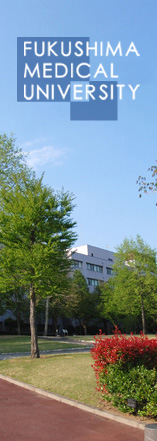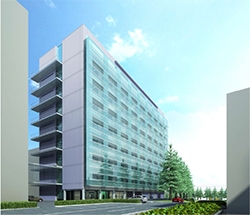

School of Graduate Education
Nagasaki University Graduate School of Biomedical Sciences
Fukushima Medical University Graduate School of Medicine
Division of Disaster & Radiation Medical Sciences Joint Major
¡ÌTo be started in April, 2016¡Í ¡ÊJapanese Site¡Ë
¡ÌEnglish WebSite 2¡Íhttp://www.fmu.nagasaki-u.ac.jp/en/
¡ü¡¡Outline

The Great East Japan Earthquake in March 2011 followed by tsunami and the nuclear power plant accident was one of the worst complex disasters ever. Under these circumstances, the shortage of the medical professionals who were able to engage in health care risk management from the time of crisis to recovery phase of disaster has become apparent. Therefore, we, Nagasaki University and Fukushima Medical University, developed the new educational course collectively, and now, the establishment of ¡ÈGraduate School of Disaster & Radiation Medical Sciences¡É is underway at both Universities. The new Master Course will be opened in April 2016, and there will be two courses as introduced below.
| Course | Medical Science Course | Nursing Course |
| It aims to foster the professionals who are able to engage in various disaster responses based on the expert knowledge. These include medical responses to radiation disaster, disaster readiness plan, medical activities and mental health care at evacuation center or temporary housing complex, and crisis/risk Communication. | It aims to foster nurses, public health nurses, and midwives who are able to engage in not only clinical radiology nursing but also nursing activities for radiation disaster medicine from the incipient phase to recovery phase of radiation disaster, based on the specialized knowledge and skills of radiation protection and radiation risk communication. | |
| Quota | Fukushima Medical Univ. : five students |
Fukushima Medical Univ. : five students |
| Degree | Master of Medical Science | Master of Nursing |
| Who we seek |
Emergency medical technicians, police officers, civil servants who engage in radiological or public health field, and those who wish to devote professional attention to above-mentioned career field. | nurses, public health nurses and midwives |
¡ü Three Policies of Disaster & Radiation Medical Sciences Joint Major
¡ÚAdmission Policy¡Û
We welcome application from highly motivated persons who have strong interest in studying disaster medicine, radiation & global medical health care, and radiation & nursing, have cooperativeness and leadership, and are willing to develop capability of coordination and communication skills for the time of disaster.
¡ÚCurriculum Policy¡Û
① In the common basic course for both Medical Science and Nursing majors, we provide the subjects for the basis of disaster & radiation medical sciences.
② In the specialized course, we provide the subjects that are related to global health care and disaster medicine for Medical Science Course, and those that are related to radiation nursing for Nursing Course.
③ Through the practical and field trainings at Fukushima Medical University, Nagasaki University and Nagasaki University Kawauchi Village Revitalization Promotion Site, students can acquire the ability to utilize and practice the specialized knowledge.
④ For the Project Research, faculties of both universities provide systematic research guidance based on the knowledge and techniques learned.
¡ÚDiploma Policy¡Û
Students are expected to acquire the abilities t (1) to exercise their cooperativeness and leadership, (2) to understand and grasp the problems at the disaster site, (3) to plan and execute the countermeasures, and (4) to lead the crisis communication and risk communication by making full use of interdisciplinary knowledge related to disaster medicine and radiation medical science in the Medical Science Course and radiation medical science and radiation nursing in the Nursing Course.
Specific capabilities that students are able to acquire after completion of the program are;
¡ü To be able to respond appropriately at the different phases of ¡ÈDisaster Cycle¡É at the complex disaster as staffs in medical institutes, transportation facilities, local government agencies and other related government agencies; especially, to manage health hazards at the acute phase , and disaster-prevention measures and risk communication at the usual condition or recovery phase from disaster, by exercising coordination and crisis communication abilities learned.
¡ü To be able to teach and cultivate the younger persons at educational institutes, local governments, or public agencies in Japan or foreign countries.
¡ü After further completion of the doctoral course, to be able to lead the projects related to crisis communications at the time of disaster at the relevant international agencies.
¡ü The Curriculum Map (Core Subjects)
| Medical Science Course | Nursing Course | |
| Basic Subjects (both courses) |
The Basic Radiation Sciences, Introduction of Disaster Medicine, Introduction of Disaster Nursing, Introduction of Emergency and Critical Care Medicine | |
| Specialized Subjects | Radiation Protection | |
| Lecture of Disaster Medicine, Lecture of Emergency and Critical Care Medicine, Disaster Psychiatry, etc | Radiation Nursing, Disaster Public Health Nursing, etc | |
| Specialized Practical Training (both courses) |
Fukushima Medical University, Nagasaki University and Nagasaki University Kawauchi Village Revitalization Promotion Site | |
| Project Research (both courses) |
Preparation of Master¡Çs Thesis by the guidance of faculties | |
¡ü Fukushima Medical Univ.¡§Entrance Examination Schedule
| August Registration | December Registration | |
| Application Period | July 17 (Tue)- July 25 (Wed), 2018 | November 12 (Mon) - November 21 (Wed), 2018 |
| Date of Examination | August 3 (Fri), 2018 | December 1 (Sat), 2018 |
| Announcement of Result | September 20 (Thu), 2018 | January 17(Thu), 2019 |
¡ü Application Guidelines for 2019 Admission ![]()
Contact information ¡§¡¡Fukushima Medical University
e-mail ¡¡Please contact us by e-mail.
¡Ê UPDATE June.2016 ¡Ë
